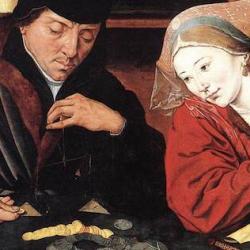George Friedman has written that the promise of the European union was not merely prosperity and peace, but joy: “the joy of joining men into a single brotherhood, overcoming the divisions of mere custom.”
But here’s the rub: Europeans have to be willing to share the same fate if they are going to achieve the aims the Union set for itself. If the brotherhood is only a brotherhood in joy, it depends on perpetual prosperity and perpetual peace, which is a promise beyond human capacity to fulfill.
He focuses what appear to be minor decisions made by the European Central Bank, but he sees in it a definition of the “limits of brotherhood. One of those limits is prosperity. Each nation determines how it will plot its own course, its money distributed by the European Central Bank, but under the rules of the individual states and without any nation being compelled to share the fate of another. The euro is a common currency that has no one’s picture on the front because the histories of eurozone countries are so divided that there are no common heroes.” It’s a way to ease economic pressures without forcing more prosperous nations (Germany especially) to shoulder the burden for everyone else.
Prosperity also emerges as a limit when the Union contemplates the possibility of secession: “If Europe can parse the common search for prosperity in this way and calmly consider the secession of one of the brotherhood, Greece, over malfeasance far from terrible on the order of human things, then what is to keep any of the Europe’s institutions intact? If you can secede or be expelled from the eurozone, and if you might choose to close your border to Slovaks seeking jobs in Denmark, then perhaps you can choose to close your borders to German products. And if that is possible, then what is the fate of Germany, which relies on its ability to sell its goods anywhere in Europe?” In short, “no country wants to be responsible for the debts of anyone else in Europe. That is not a foolish position, but it makes a union impossible, certainly not one that can overcome custom.”
And that means that the European Union has failed – not economically or politically primarily, but as a moral ideal. It has not achieved a European brotherhood because there cannot be a brotherhood of joy without a brotherhood in sorrow, no brotherhood of wealth without a willingness to share loss.















